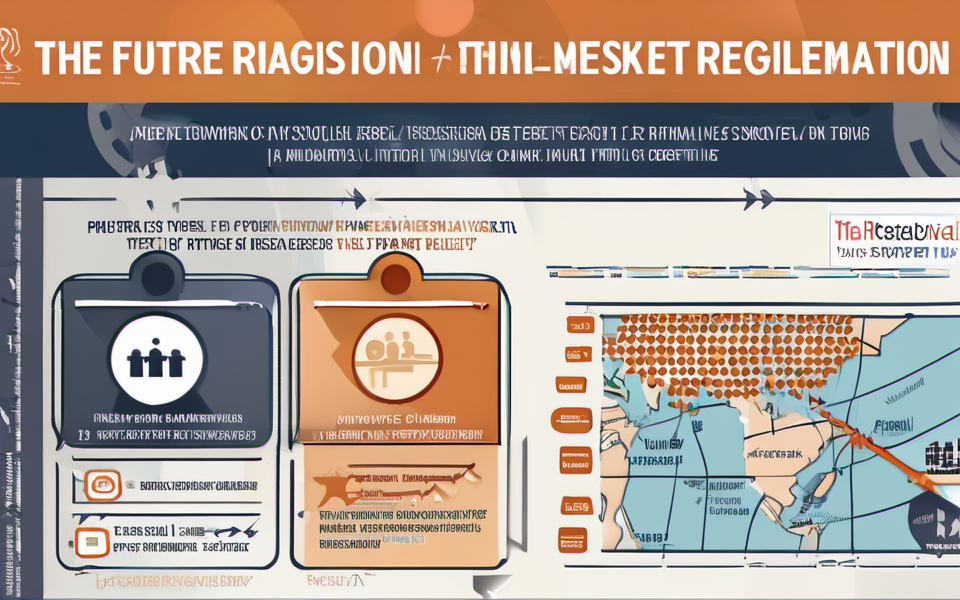Prepare to be Shocked: The Future of Market Regulation Isn’t What You Think!
You might be thinking: “Market regulation? That’s boring! It’s just a bunch of rules, right?” But buckle up, because the future of market regulation is anything but boring. We’re on the brink of a revolution in market oversight, driven by technology, consumer empowerment, and a newfound focus on sustainable and ethical growth. It’s time to ditch the dusty old rule books and embrace a dynamic new approach that prioritizes responsible innovation.
Tech Takes the Wheel: How AI and Blockchain are Reshaping Regulation
Forget the days of manual data analysis and tedious paperwork. Technology is about to rewrite the rules of the game. Think artificial intelligence (AI) powering real-time market monitoring, predictive analytics, and automated fraud detection. Imagine blockchain technology revolutionizing transparency and accountability, enabling secure and verifiable data sharing across the entire financial ecosystem.
AI-Powered Market Oversight: A New Era of Efficiency
With AI-powered market surveillance becoming mainstream, regulators are gaining unprecedented insights into market behavior. Machine learning algorithms can identify anomalies and potential market manipulation in milliseconds, giving authorities a critical edge in tackling fraudulent activity. These systems can analyze massive datasets, capturing even the subtlest patterns and flagging potential risks, while freeing human analysts to focus on complex, high-impact investigations.
Blockchain for Trust and Transparency
Blockchain technology is transforming everything from supply chain management to voting systems. Now, its impact on market regulation is gaining momentum. Distributed ledger technology (DLT) can revolutionize financial services by providing a permanent, secure, and transparent record of transactions. This enhances compliance with regulatory frameworks by making it easier to track transactions, verify identity, and prevent money laundering activities.
Consider these use cases:
- Trade Financing: Smart contracts can automate complex trade finance processes, reducing risk and increasing efficiency.
- Cross-border Payments: Blockchain technology can simplify international payments, streamlining procedures and minimizing transaction fees.
This transparent and auditable system empowers consumers with real-time information on how their money is being used. This will foster trust and confidence in the financial system, ultimately driving more responsible investments and sustainable financial practices.
Beyond the Bottom Line: Sustainability and Ethics at the Forefront
The future of market regulation isn’t just about profit. It’s about building a more ethical and sustainable future for all. Expect to see stricter regulations targeting environmental, social, and governance (ESG) practices, with emphasis on promoting responsible business practices. Companies will face scrutiny on their impact on climate change, social responsibility, and corporate governance.
Investing for the Future: A New Wave of Sustainable Finance
Investors are increasingly demanding ESG-aligned investments. This demand is shaping the regulatory landscape, leading to the emergence of green bonds and sustainable investing funds. Regulators are responding with stricter disclosure requirements, pushing for transparency in sustainability practices, and developing standards for measuring the impact of ESG investments.
Ethical Consumerism Fuels the Revolution
Consumers are increasingly demanding transparency and accountability from businesses. They want to understand the ethical and environmental implications of their purchases. This growing consumer awareness will pressure businesses to adopt sustainable practices.
The Future of Regulation: A Collaboration for Success
The future of market regulation demands collaboration and a shared vision across the financial landscape. Regulators, financial institutions, and tech companies must work together to develop and implement innovative solutions.
Key stakeholders must engage in continuous dialogue to anticipate and address emerging risks and ensure regulatory frameworks keep pace with innovation. By embracing agile governance and leveraging technology, regulators can effectively adapt to a constantly evolving world.
A key example of this collaboration is the growing use of RegTech solutions, which integrate technology with regulatory frameworks, to create more efficient and data-driven oversight.
Key Takeaways
- The future of market regulation is defined by technology, with AI and blockchain shaping a more efficient and transparent financial landscape.
- Sustainability and ethical practices will be core components of market regulation, promoting responsible business practices.
- The future demands a collaborative approach, with regulators, businesses, and technology companies working together to foster innovation and protect investors.
We stand on the threshold of a new era in market regulation, one that emphasizes responsible innovation, sustainable growth, and the empowerment of consumers. The future of market regulation will be dynamic, ever-evolving, and profoundly impactful on our financial systems and our future.




